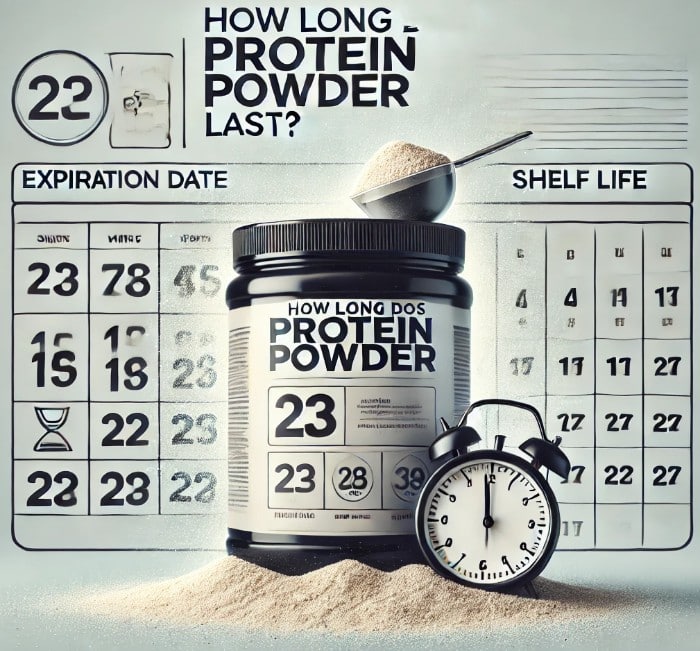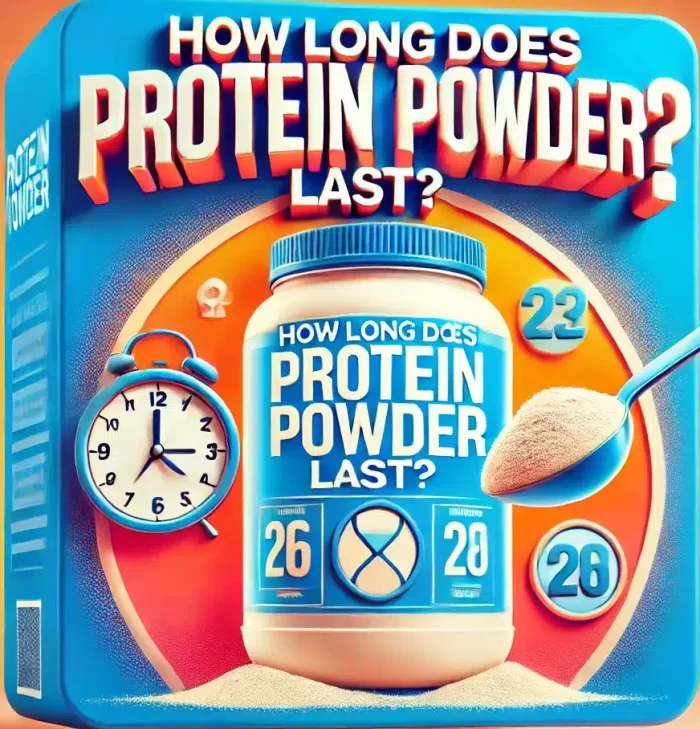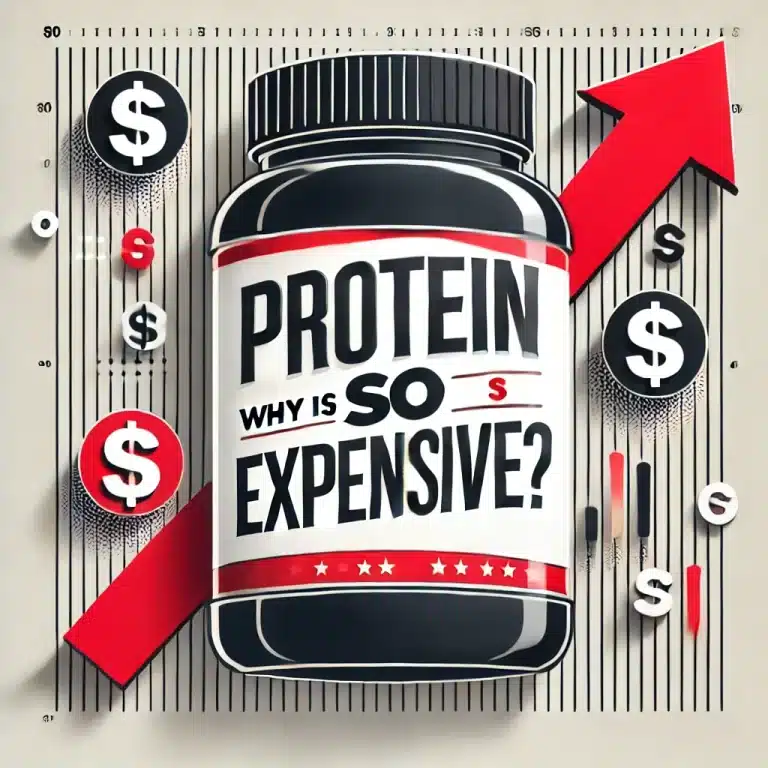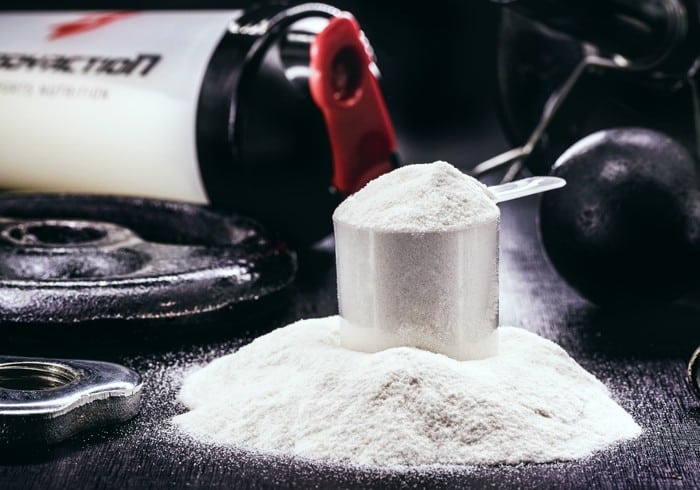How Long Does Protein Powder Last?
If you’ve ever found an old tub of protein powder in the back of your pantry, you’ve probably wondered: Does protein powder expire? Can you still use it past the expiration date, or is it time to toss it? Understanding the shelf life of protein powder is essential for getting the most out of your supplement without compromising quality or safety.
In this guide, we’ll break down how long protein powder lasts, what affects its shelf life, how to store it properly, and how to tell if it’s gone bad. Whether you’re a fitness enthusiast, an occasional gym-goer, or someone who enjoys adding protein to their diet, this article will give you all the details you need.
Does Protein Powder Expire?
Like all food products, protein powder expires, but the good news is that it has a fairly long shelf life. Most protein powders are shelf-stable for about 12 to 24 months, depending on the type, ingredients, and how they’re stored. However, even past the expiration date, many protein powders are still safe to consume if they show no signs of spoilage.
Protein powders typically come with a “best by” or “use by” date, which indicates when the manufacturer guarantees optimal quality. Unlike perishable foods such as milk or fresh produce, protein powder doesn’t spoil immediately but may lose its potency and flavor over time.
Several factors can influence how long protein powder lasts:
- Type of Protein – Whey and casein tend to have shorter shelf lives than plant-based or collagen protein powders due to their dairy content.
- Additional Ingredients – Powders containing added fats, probiotics, or sweeteners may degrade faster than simple, pure protein powders.
- Storage Conditions – Proper storage plays a huge role in extending the lifespan of your protein powder. Heat, humidity, and air exposure can speed up spoilage.
- Packaging – Most manufacturers use airtight containers designed to keep out moisture and air, but if the packaging is damaged or left open, the powder may deteriorate faster.
- Exposure to Moisture – If protein powder absorbs moisture from the air, it can lead to clumping and bacterial growth, significantly shortening its lifespan.
So, while protein powder does expire, the actual “safety window” can often extend well beyond the printed date if the product has been stored correctly. Many fitness enthusiasts have used protein powders safely months past their expiration date by ensuring proper storage.
How Long Does Protein Powder Last? (By Type)
Different types of protein powders have slightly different shelf lives due to their ingredients and processing methods. Here’s a general guideline:
| Type of Protein Powder | Typical Shelf Life |
|---|---|
| Whey Protein (Concentrate & Isolate) | 12 – 18 months |
| Casein Protein | 18 – 24 months |
| Plant-Based Protein (Pea, Hemp, Rice, etc.) | 18 – 24 months |
| Collagen Protein | 18 – 24 months |
| Egg White Protein | 12 – 18 months |
| Mass Gainers (Blends with carbs & fats) | 6 – 12 months |
Here’s a closer look at why these protein powders have different expiration dates:
- Whey Protein (Concentrate & Isolate) – Since whey protein is derived from dairy, it has a shorter shelf life compared to plant-based options. Whey isolate lasts slightly longer than concentrate due to its lower lactose and fat content, reducing the risk of spoilage. If whey protein is stored in a warm or humid environment, it may develop a stale or sour taste sooner than expected.
- Casein Protein – Casein protein is also dairy-based but has a longer shelf life than whey because it undergoes a slower digestion process and tends to contain fewer added ingredients that could go bad over time. Since casein is slow-digesting, it remains stable longer and is less likely to absorb moisture as quickly as whey.
- Plant-Based Protein – Pea, hemp, and rice protein powders last longer because they contain fewer perishable ingredients. They are naturally more stable but can still degrade if exposed to moisture or heat. Some plant-based protein powders contain added fiber or omega-rich ingredients, which can affect their shelf life.
- Collagen Protein – Since collagen powder is hydrolyzed and contains minimal perishable ingredients, it has a longer shelf life compared to other types of protein. It’s highly stable and less prone to spoilage, making it one of the longest-lasting protein powders available.
- Egg White Protein – This type of protein powder has a similar lifespan to whey but can spoil faster if not stored properly since egg whites are more sensitive to moisture and bacteria. If exposed to air or heat, egg white protein may develop a strong, unpleasant smell, signaling that it has gone bad.
- Mass Gainers – These protein powders contain added carbohydrates and fats, which are more prone to spoilage, giving them a shorter shelf life. The fats in mass gainers can go rancid, leading to a noticeable off-taste and smell. Always check the expiration date on mass gainers before using them past the recommended time frame.
If you use protein powder regularly, it’s helpful to check the expiration date on the packaging and store it correctly to get the most out of its shelf life. Additionally, buying smaller tubs instead of bulk containers can help ensure freshness if you don’t consume it quickly. If you prefer to buy in bulk, be mindful of how long it will take to use the entire container before purchasing.
Does Protein Powder Go Bad After Expiration?

The expiration date on protein powder is typically a “best by” or “use by” date, which means the manufacturer guarantees optimal quality until that time. However, protein powder doesn’t necessarily spoil immediately after this date.
If stored properly, protein powder can last beyond the expiration date, but its quality may decrease. Over time, exposure to moisture and heat can cause protein degradation, making it less effective and potentially altering the taste and texture. It’s always a good idea to perform a smell, taste, and texture test before using a protein powder that is past its expiration date.
One thing to consider is the breakdown of added nutrients. Some protein powders contain vitamins, minerals, and probiotics, which can lose potency over time. While this doesn’t make the powder unsafe to consume, it may not deliver the same nutritional benefits as when it was fresh.
Additionally, old protein powder may mix poorly in shakes or develop a grainy, chalky texture, which can affect your enjoyment of it. If the consistency or flavor seems off, it might be best to replace it.
Signs That Protein Powder Has Gone Bad:
Even though protein powder has a long shelf life, it can still go bad. Here are some telltale signs that you should toss it:
- Foul or Rancid Smell – If your protein powder smells sour, musty, or just “off,” it’s a sign of spoilage.
- Clumping or Hard Texture – Moisture exposure can cause clumps, which may indicate mold growth or bacterial contamination.
- Color Changes – If the powder looks darker or has unusual spots, it might have oxidized or developed mold.
- Unpleasant Taste – A bitter, stale, or sour taste means the ingredients have likely degraded.
- Presence of Mold – Any visible mold or strange particles are a clear indication that it’s time to discard the product.
If you notice any of these signs, don’t take any chances, throw the protein powder away and get a fresh container.
How to Store Protein Powder for Maximum Shelf Life?
Proper storage is key to keeping your protein powder fresh and effective for as long as possible. Even though protein powder has a long shelf life, poor storage habits can cause it to degrade quickly. Here are some essential tips to ensure that your protein stays in the best condition:
1. Keep It Cool and Dry
The most important factor in extending protein powder’s shelf life is avoiding heat and moisture. Store it in a cool, dry place, such as a pantry, cupboard, or kitchen cabinet. High temperatures and humidity can cause the powder to clump and spoil faster.
- Best locations: Pantry, dry kitchen shelf, or cabinet
- Worst locations: Near the stove, sink, or refrigerator where heat and moisture fluctuate
2. Seal It Tightly After Every Use
Each time you open your protein powder, you expose it to air and moisture, which can cause it to degrade faster. Always make sure the lid is tightly sealed after each use. If your protein powder comes in a resealable bag, press out any excess air before sealing it.
- Pro tip: If the original container doesn’t seal well, consider transferring the protein powder to an airtight container with a secure lid.
3. Avoid Storing in the Fridge or Freezer
While refrigeration may seem like a good idea, it’s not recommended. Storing protein powder in the fridge or freezer introduces condensation when you take it out, leading to moisture buildup inside the container. Over time, this can cause clumping and potential mold growth.
4. Use Silica Gel Packs (If Available)
Many protein powders include small silica gel packets, which help absorb moisture and keep the powder dry. Don’t throw these away! They play an important role in preventing clumping and prolonging freshness.
- If your protein powder doesn’t come with a silica packet, you can place a food-safe silica packet inside the container to help absorb any excess moisture.
5. Keep It in Its Original Packaging
Manufacturers design protein powder containers to help preserve freshness, so it’s best to keep it in its original packaging. If you prefer transferring it to a different container, make sure it’s a BPA-free, airtight, and moisture-proof container.
6. Don’t Use Wet Scoops
A common mistake people make is using a damp scoop when measuring out protein powder. Even a tiny amount of moisture can cause clumps and create the perfect environment for bacterial growth. Always make sure your scoop is completely dry before putting it back into the container.
7. Check for Signs of Spoilage Regularly
Even with the best storage methods, it’s a good idea to periodically check your protein powder for signs of spoilage. If you notice an unusual smell, changes in texture, or visible mold, discard it immediately.
Can You Use Expired Protein Powder?
The big question many people ask is, can you still use protein powder after it expires? The short answer is: it depends. Just because the expiration date has passed doesn’t necessarily mean the protein powder is bad. The key is to check for signs of spoilage before deciding whether to use it.
If stored properly in a cool, dry place, protein powder can still be safe to consume a few months past its expiration date. However, you might notice changes in taste, texture, and mixability. Over time, protein powder may lose some of its potency, meaning you might not get the same nutritional benefits as you would from a fresh batch.
On the other hand, if your protein powder has been exposed to humidity, heat, or air, its quality will degrade much faster. If you notice a sour smell, unusual clumps, or an off-taste, it’s best to throw it out. Using expired protein powder that has gone bad could lead to digestive discomfort or a subpar workout shake.
Here’s a quick checklist for deciding if you can still use expired protein powder:
- Smells normal? No sour or rancid odor.
- No clumping? The powder should still be dry and smooth.
- Color is unchanged? No dark spots or discoloration.
- Tastes okay? No bitterness or off-flavors.
If you can check all these boxes, your protein powder is probably still safe to use. However, if anything seems off, it’s best to err on the side of caution and discard it.
Does Expired Protein Powder Make You Sick?
This is another common concern, can consuming expired protein powder make you sick? The answer depends on how long it’s been expired and how it has been stored.
If your protein powder has simply passed its best-by date but shows no signs of spoilage, it’s unlikely to cause harm. At worst, it might not taste as good or deliver the same nutritional value as fresh protein powder. The protein content may degrade slightly over time, but it won’t necessarily make you ill.
However, if your protein powder has been exposed to moisture, bacteria, or mold, it could pose a health risk. Consuming protein powder that has gone bad could lead to digestive discomfort, stomach cramps, nausea, or food poisoning, especially if mold or bacteria have started to grow in it.
To avoid any potential issues, always perform a quick quality check before using old protein powder. If anything looks, smells, or tastes off, don’t take the risk, throw it out.
Key Takeaways:
- If you have a sensitive stomach, it’s best to stick to fresh protein powder to avoid digestive issues.
- Expired protein powder that has been stored correctly is usually safe but may have reduced quality.
- If the powder smells, looks, or tastes bad, don’t use it.
- Protein powder that has been exposed to moisture is more likely to spoil and should be discarded.
Final Thoughts:
Protein powder is a convenient way to meet your protein needs, but like any food product, it won’t last forever. Most protein powders last 12-24 months, but proper storage can help extend their shelf life. Always check for signs of spoilage before using an old tub, and when in doubt, trust your senses, if it smells bad or looks off, it’s time to toss it.
By following these tips, you can keep your protein powder fresh, effective, and safe for as long as possible.






